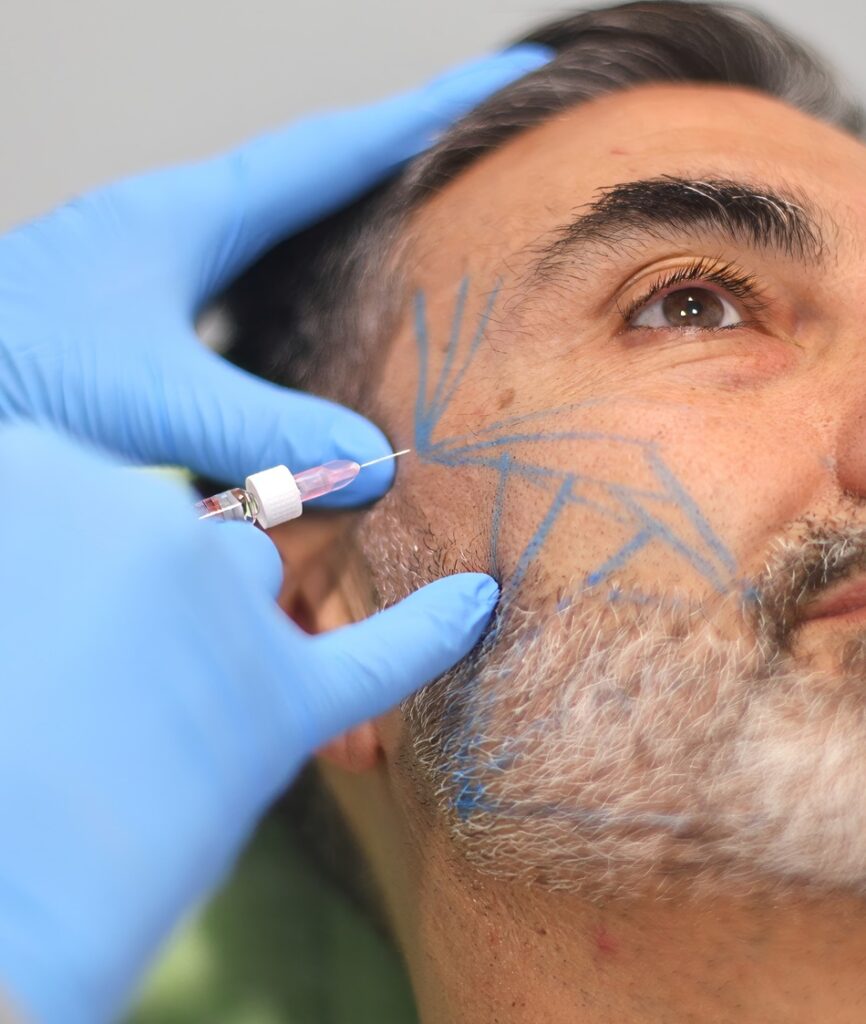Skin booster treatment is a popular non-invasive procedure designed to enhance the skin's hydration, texture, and overall appearance. This treatment involves the injection of hyaluronic acid (HA), a naturally occurring substance in the skin, which helps to retain moisture and promote collagen production.
Skin boosters are typically injected into the deeper layers of the skin, where they can:
Improve Hydration: Hyaluronic acid attracts and retains moisture, providing intense hydration to the skin.
Enhance Skin Elasticity: By stimulating collagen production, skin boosters help improve the skin's elasticity and firmness.
Smooth Fine Lines and Wrinkles: The increased hydration and collagen production can reduce the appearance of fine lines and wrinkles.
Promote Radiance: Skin boosters can give the skin a healthy, glowing appearance by replenishing essential nutrients.
Consultation: Before the procedure, you'll have a consultation with our healthcare professional to discuss your goals, medical history, and any potential risks.
Preparation: The treatment area is cleaned, and a topical anesthetic may be applied to minimise discomfort.
Injection: Our treating Nurse will use a fine needle or cannula to inject the product into the targeted areas. Multiple injections may be needed to achieve the desired results.
Post-Treatment Care: You will be given specific aftercare instructions, such as avoiding strenuous activities, excessive sun exposure, and certain medications for a short period.

Whilst Skin boosters and Polynucleotides can be used in combination if deemed appropriate for the patient and both treatments offer unique benefits and can be tailored to individual skin concerns and goals, here are some differences between the two:
How Does Skin Booster Treatment Differ from Polynucleotides Treatment?
While both skin booster and polynucleotides treatments aim to rejuvenate the skin, they differ in their composition and specific benefits:
Composition
Skin Boosters: Primarily composed of hyaluronic acid, which is known for its excellent moisture-retaining properties.
Polynucleotides: Made from natural DNA fragments that act as biostimulators to promote cellular regeneration
Duration of Results
Skin Boosters: Results can last around 6 to 9 months.
Polynucleotides: Effects can last several months, with multiple sessions recommended for optimal results
Targeted Benefits
Skin Boosters: Best for improving hydration, reducing fine lines and wrinkles, and enhancing skin radiance.
Polynucleotides: Effective for boosting skin hydration, improving elasticity, enhancing skin tone and texture, and supporting tissue regeneration
The duration of dermal filler results can vary based on the type of filler used, the area treated, and individual factors. Typically dependent upon the filler and person, 12-24 months. Factors such as the treatment area, individual metabolism, and lifestyle choices (e.g., sun exposure, smoking) can also influence how long the results last
Most patients experience minimal discomfort. A topical anaesthetic can be applied prior to administration of dermal filler. The pain can be minimised through different injection techniques and the use of dermal filler with lidocaine.
Dermal fillers and Botox serve different purposes. Fillers add volume and smooth out wrinkles, while Botox relaxes muscles to reduce the appearance of wrinkle. The nurse will assess and discuss the best options for your personalised desired results.
Common side effects include redness, swelling, bruising, itching, or tenderness at the injection site. These usually resolve within a week, but can vary from person to person.
Before the treatment, avoid blood-thinning medications and alcohol. After the treatment, avoid strenuous activities, excessive sun exposure, and touching the treated area for a few days. Avoid any facials such as microdermabrasions, hydrofacials and chemical peels for a minimum of two weeks before and after.
Common side effects include redness, swelling, bruising, itching, or tenderness at the injection site. These usually resolve within a week, but can vary from person to person.
People who are allergic to any components in the filler, pregnant or breastfeeding, or taking blood thinners or immunosuppressants should avoid dermal fillers

Copyright © 2025 Visage Cosmetics. All rights reserved.